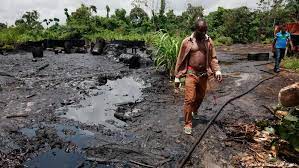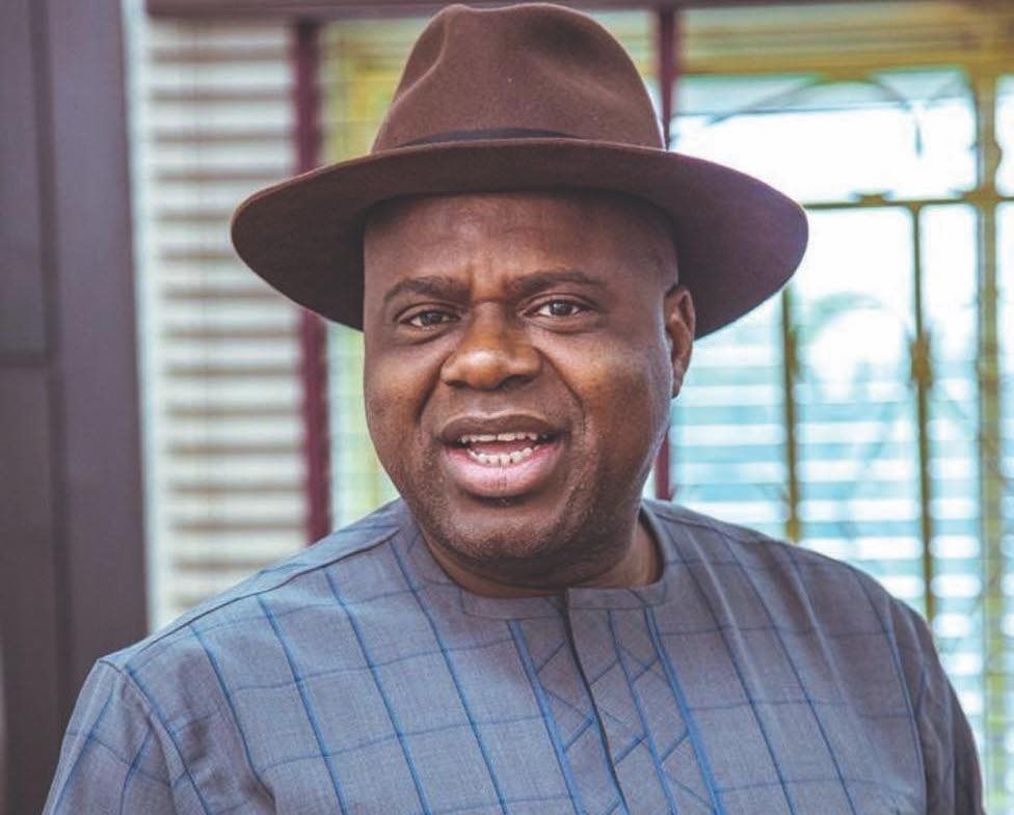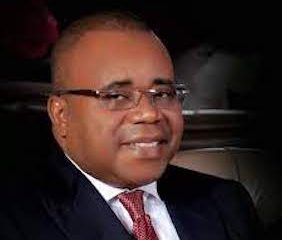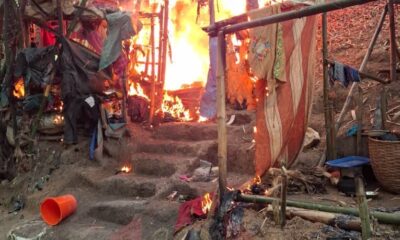COVER
Niger Delta Leaders Have Failed the People – Enang

Senator Ita Enang has been a Legislator in most of his political career. He was first elected Councillor and later served in Akwa Ibom House of Assembly before proceeding to the House of Representatives and ultimately, the Senate, where he served for two terms. The former Presidential Liaison Officer (Senate) who serves as Senior Special Assistant to the President on Niger Delta Affairs in this interview to mark the nation’s 60th Independence anniversary bares his mind on some critical issues in the polity. Excerpts.
This is the diamond age of Nigeria’s independence, how will you assess the journey so far?
I think we done very well, we thank God that we are able to stay together as one country, although in a different heart the things in our hearts and our consciousness are different they were still bond together by geography and international dialogue the leaders of the country have done very well, they’re respected leaders, we started by bloodshed, the different coups and ethnic suspicions, which led to the 1964,1965,1966 and 1967 challenges of the country and now we are able to stay together.
One of the greatest achievement is that we have been able to have democracy running consecutively for the last 21years, so we congratulate Nigerians. I want to say that we would have done better as a country.
We are self governing, we are a democracy but we are not independent. The only thing we can call independent is we are independent of foreign rulers but we are not independent as a country, because we have not yet produced what we can eat or we have not yet refined our petroleum, we don’t add enough value to our petroleum.
In agriculture, we are not self- sufficient in technology, we are are not deploying the technology of other countries into our country and yet don’t explore the democratic resources into the technological advancement of our citizens.
In terms of our currency, we have not done well at all. In the ‘80s the naira was stronger than the Dollar and Pounds. In the ‘80s the dollar exchange was about $3 or $4 dollars to one naira, the Pounds was two pounds to one naira, how do we get to where we are? So we have to go and see again how we can re-invent our country and make sacrifices.
The other problem is that individuals and persons in government don’t see themselves as serving the public. Persons in government and public offices see it as an opportunity to make money, as an opportunity to show up they don’t see it as an opportunity to develop the country or to add value to the country. Most persons in public offices don’t see their Nigeria with like the British, European and Americans see their countries.
They do not see public offices as an opportunity to grow the country, to add value to the country, create employment. People in public offices see it as an opportunity to make money, to show up, to say, I have arrived. These are part of the things we lost, which we will not gain in our 60 years of independence but I am praying to God that under the leadership and the hand of President Buhari, who also says to me “do the right thing go and do the right thing, you will account to your God.” Let all public officers follow the example of President Buhari, who believes in doing the right thing, they will account to their God
You were Chairman of House committee on Rules and Business, while in the House, from your experience, what can you tell us about the role and performance of the legislature in Nigeria since independence?
I want to congratulate the Nigerian people again for the 21 years of democratic rule. In the existence of the legislature, it does appear that the public still takes the legislature as the opposition party, but the legislature has done well because the legislature is the conscience of the people. I am very grateful to the legislature because its the legislature that brings out things that are happening in different Ministries, Departments and Agencies.
A president or governor will not know when there is crime or corruption in any office, he will not know when money is been appropriated, he will not know when things are not going well in any of the ministries, where money has been misappropriated he will not also know where programmes that are to be executed are not well executed, as they were meant to be other than the legislature through over sight function, through the process of public hearing.
And of course, the legislature has to come to stay. Something is getting very wrong with the legislature and I want to say with the greatest respect to the present legislature, the 7th Assembly, the 8th Assembly and the 9th Assembly. I was a member of the 7th Assembly in the Senate.
At the time I was in the Senate, the standard had started getting down. You will have a situation where you bring a bill on the floor, you don’t have the bill debated, you don’t have the essentials of the bill debated and and you don’t have situation where you have votes and proceedings produced, you don’t have the situation where you have the handsards showing the debate on any bill to know the thinking of the legislature.
In Law, one of the best means of knowing when the judge is based on interpretation of any law and is not guided by any precedent, he will want to say, what was the intention of the legislature and sometimes when you want to know the intention of the legislature, you go to the handsards of the legislature , and the handsards of the legislature is showing the drain and flow of debate, it’s that flow of debate that the judge will take, read and know, this was the thinking of the legislature. But now you will go to the legislature, you won’t find the handsards, sometimes they don’t produce the vote and proceeding.
Take for instance, we have the CAMA act, a lot of people say they do not see or know because there was no dated debate on it and even the vote and proceedings were not produced because not everybody had it.
Now take for instance, what is happening in Imo state today and what I’m saying is not really applicable to the National Assembly but to the State Houses of Assembly, the state houses of assembly have been reduced to parastatal of the governors.
Take the example of Imo state, they passed the administration of criminal justice Act and according to social media, and the sponsor of the bill, what was presented to the governor for signature is different from what was passed on the floor, which can not happen, which is a criminal action.
In 2002 or 2003, when there was an injection of something wrong into the electoral Act under Obasanjo administration, when there is something into the Act before it was forwarded to the president, so the legislature is gradually going low , because, when you take the vote and proceeding argument, in the Assembly of 1999 to 2003, and take the one of 2003 to 2007, take the one of 2007 to 20011 you will see contributions, you will see men who were prepared for the legislature, you will see the argument of lawyers, engineers, architects, doctors different professionals, you will see what people did
now if you pick those things, you will not see what even a sponsor of a bill will do, therefore the national assembly and the legislature should go back, thank God I urge the Senate president who is the longest serving member, he was with me in the house of representatives from 1999 to 2007, in 2007 he left to the Senate I was the One that continued in the house of representatives in 20011, as of today he spent one year on the floor of the legislature as a Senate president let him recall as it’s working and then bring back that level of intellectual argument.
How will you describe the situation in the Niger delta since 1960?
Niger Delta shouldn’t be weeping and wailing today. It appears raped by the very country it has helped but it is more raped by the indigenes of the region because the things that come for the development of the Niger Delta through different struggles have gone into the hands of the leaders of the Niger Delta, who have found opportunity to be in government.
They have not done well for the citizens. Look at the derivation principle, it was supposed to be for the development of the Niger Dtelta but it is given to the Governors and the governors use it to compete among them selves who Will fly the newest private jet.
I saw a post the other day and I wept, which Said, compare the convoy of President Buhari with the cars and convoy of a particular governor in Niger Delta. I wept because when you see the cars of a governor in the Niger Delta, then you will see that the region is not suffering from the hand of the country but it’s suffering from the hand of it’s citizens. Go and look at the local content fund, look at how the oil companies are treating the area.
The Governors should set up a special purpose vehicle that goes to develop Niger Delta with the derivation money at least if they want to give this thing, give only 20 percent to the Governors to develop the Urban areas, let the 80percent go to the development of Niger Delta oil producing communities.
There are times that we have stoppage of oil production. It’s because some communities want just a primary school, they want Just a road and a market, if you go to Ogbosi community, the ogba kingdom in Ogba LGA in Rivers state, you will find soldiers always surrounding and protecting the gas plant there.
The gas plant that feeds this country. The gas plant from there is going to be joined by the gas pipe line in delta to take gas through the West African gas pipe line, it is that gas that is coming to Ajaokuta and it’s being linked to Kaduna and Kano, contract has been awarded worth over $2billion. Yet the community, where this gas comes from – Ogbosi, is asking for primary school; Is asking for a market; Is asking for a one kilometer road. What these people are asking for does not even amount to revenue that accrues from from one hour production of gas
COVER
DAILY ASSET Appoints Torough, Editor, Names Eze, Deputy

By Laide Akinboade, Abuja
As part of efforts to reposition the newspaper for optimum corporate performance, the management of Asset Newspapers Limited, Publishers of DAILY ASSET, has announced the appointment of David Torough as the Editor of the Abuja-based national daily.
A statement by the management said the appointments were part of the company’s new strategy to further penetrate the various states in the country and raise its readership and patronage.
“DAILY ASSET is widely acceptable across the country and to maintain our leadership position, we need to increase management presence, hence the need to create new Bureau offices in some locations outside Abuja and Lagos,” the statement quoted the Publisher/ Editor-in-Chief, Dr Cletus Akwaya to have said.
In a statement yesterday, Publisher and Editor-in-Chief of the fast-growing daily, Dr. Cletus Akwaya said the appointment was part of the new strategy to properly situate the paper for better productivity.
“DAILY ASSET has a commitment with the Nigerian people. We are determined to weather the storm and give Nigerian readers a Newspaper that satisfies their yearnings and reading pleasure and we can only do that with the right set of professionals,” the statement said.
Akwaya, a former Commissioner of Information from Benue State said the difficult times being faced by Nigerians posed a great challenge to the media as the people deserved credible information with which to make choices.
“We have a bond with the people, to offer credible information at all times in the best tradition of the Nigerian Press and on this scale of objectivity, truth and fairness, we pledge to remain steadfast no matter the challenges,” Akwaya was quoted to have said.
He said the newspaper will maiantin its daily print run and circulation to all states of the federation and urged advertisers to take advantage of the deep penetration of the Daily Asset brand to send their messages.
Torough, the new Editor has had a steady rise in the Newspaper in the last five years.
A graduate of Mass communication of the Benue State University, Makurdi, Torough joined the company in 2022 as Benue State Correspondent. He was spotted for his brilliance and redeployed to Abuja the following year and promoted to Deputy News Editor. He was subswuently named Deputy Editor of the paper, a position he held until the recent appointment.
Torough has attended several journalistic workshops and trainings to properly equip himself for the task ahead.
The statement also said the Management named Eze Okechukwu as Deputy Editor.
Before his elevation as Deputy Editor, Eze has been Deputy Politics Editor and DAILY ASSET Newspaper correspondent covering the Senate, having joined the organization in 2021.
Born on March 10, 1975, Eze holds a Masters Degree in Mass Communication from the Enugu State University of Science and Technology.
Eze began his journalism career with Daily Star, Enugu and later worked with Daily Trust Newspaper, Abuja as sports reporter.
Aside from his journalistic excellence, he has a great deal of passion for sports.
COVER
Insecurity: Northern Govs, Monarchs Seek Six-month Mining Suspension

From Ngutor Dekera, Kaduna and Aliyu Askira, Kano
Northern governors and traditional rulers yesterday called for the suspension of mining activities across the region for six months, blaming illegal mining for worsening insecurity in many states.The resolution was contained in a communiqué issued after a joint meeting of the Northern States Governors’ Forum and the Northern Traditional Rulers’ Council held at the Sir Kashim Ibrahim House, Kaduna.
The meeting, chaired by the Gombe State Governor and NSGF Chairman, Muhammadu Yahaya, had in attendance the 19 northern governors and chairmen of the 19 states’ traditional councils. The Forum expressed concern over the escalating violence in parts of the North, including the killings and abductions recently recorded in Kebbi, Kwara, Kogi, Niger, Sokoto, Jigawa and Kano states, as well as renewed Boko Haram attacks in Borno and Yobe.“The Forum extends its deepest condolences and solidarity to the governments and good people of the affected states,” the communiqué said, noting that the attacks on schoolchildren and other citizens had become “unacceptable tragedies” that required urgent collective action.It commended President Bola Tinubu for what it described as the Federal Government’s “firm response” to recent abductions and insurgency threats, especially the rescue of some abducted pupils.The governors also saluted security agencies for their sacrifices on the frontlines.“We resolved to renew our support for every step taken by the President and Commander-in-Chief to take the fight to insurgents’ enclaves in order to end the criminality,” the Forum stated.A major highlight of the meeting was the North’s renewed push for the establishment of state police, with governors and traditional rulers insisting that decentralised policing had become inevitable.“The Forum reaffirms its wholehearted support and commitment to the establishment of state police,” the communiqué added, urging federal and state lawmakers from the region to “expedite action for its actualisation.”On illegal mining, the governors said criminal mining networks were fuelling violence and providing resources for armed groups.As a corrective measure, they asked Tinubu to direct the Minister of Solid Minerals to impose a six-month suspension of mining activities in order to allow for a full audit and revalidation of licences.“The Forum observed that illegal mining has become a major contributory factor to the security crises in Northern Nigeria. “We strongly recommend a suspension of mining exploration for six months to allow proper audit and to arrest the menace of artisanal illegal mining,” it said.To strengthen the fight against insecurity, the governors also announced the creation of a regional Security Trust Fund.Under the proposed arrangement, each state and its local governments will contribute ₦1bn monthly, to be deducted at source under an agreed framework.They said the fund would help provide sustainable financing for joint operations, intelligence-driven interventions and coordinated security responses across the region.At the end of the meeting, the Forum reaffirmed its commitment to unity and collective responsibility.“Only through unity, peer review and cooperation can we overcome the pressing challenges before us,” it declared.The Forum agreed to reconvene on a date to be announced.Meanwhile, Nigeria’s worsening security crisis took a grim turn on Monday as bandits launched fresh attacks in Kano State, abducting 25 villagers, even as the Federal Government raced to secure the release of more than 300 Catholic school children kidnapped in Niger State.In the early hours of Monday, armed bandits invaded Unguwar Tsamiya—popularly called Dabawa—in Shanono Local Government Area of Kano State, whisking away nine men and two women after shooting into the air and assaulting residents. The attackers also rustled two cows.A resident lamented the community’s helplessness: “We cannot do otherwise; most of us cannot leave because we have nowhere to go. This is our place, our land and everything is here.”The assault came less than 24 hours after a similar attack on Yan Kamaye in Tsanyawa LGA, a community along the volatile Katsina border.In Niger State, National Security Adviser Nuhu Ribadu has assured distraught families of St. Mary’s Co-Education School, Kontagora that the more than 300 students and staff abducted on November 21 will return home “soon.” Ribadu, who led a high-level federal delegation to the school on Monday, said the abductees are safe, though he offered no specifics on their location or the status of rescue operations.According to Daniel Atori, spokesman for the Catholic bishop overseeing the school, the NSA reassured officials: “The children are where they are and will come back safely.”The St. Mary’s attack is part of a worrying resurgence of mass kidnappings reminiscent of the 2014 Chibok schoolgirls’ abduction. Security analysts warn that banditry has evolved into a “structured, profit-seeking industry,” with hundreds of Nigerians abducted in November alone.The Kontagora school abduction occurred the same week 25 girls were kidnapped in Kebbi State—victims who authorities say have since been rescued through “non-kinetic” means. About 50 of the St. Mary’s hostages have also managed to escape.Ribadu’s delegation, which included the Minister of Humanitarian Affairs and the Director-General of the Department of State Services (DSS), reaffirmed the government’s commitment to securing the freedom of all abducted citizens.As communities from Kano to Niger continue to bear the brunt of these violent incursions, the escalating spate of kidnappings underscores the urgent national demand for a more decisive and coordinated security response.COVER
Abacha Loot Probe: Malami Faces EFCC Panel Daily in December
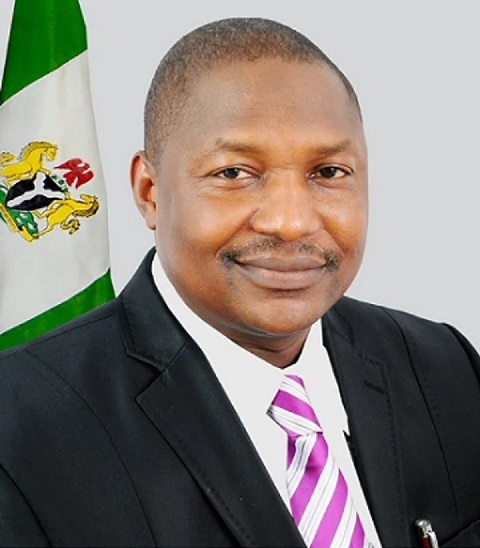
By David Torough, Abuja
The Economic and Financial Crimes Commission (EFCC) said former Attorney‑General of the Federation and Minister of Justice, Abubakar Malami, will face a team of interrogators at its office daily throughout December.A credible source in the EFCC said on Monday that the daily appearance was part of an ongoing investigation into the whereabouts of an alleged 490 million dollars Abacha loot secured through a Mutual Legal Assistance (MLAT) request.
The source said that Malami, who was summoned for interrogation by the EFCC on Saturday, was barred from leaving Nigeria for the next one month.According to the source, one of the conditions for his release on Saturday was that he should report daily to the EFCC Headquarters in Abuja for further interrogation.The source said Malami would have to appear daily at the anti-graft office due to the volume of the investigation and the seriousness of the charges against him.”We seized his passport, it is the normal routine during investigation, but he has to report at the EFCC headquarters in Abuja every day for the next month.”He will be reporting for further investigation throughout December.”He will be reporting every day, starting from Dec. 1st to Dec. 31st.He will appear before the team of investigators for the entire month of December.”He will be reporting to EFCC for investigation for the period because of the volume of the investigation and the seriousness of the charges against him,” the source added.According to the source, a fact sheet on the former minister revealed that Malami had several issues to clarify with the EFCC within the coming weeks.“We have asked him to explain the whereabouts of the $490 million Abacha loot secured through MLAT.“We didn’t say he stole money, but he should account for the loot. This is one of the issues he will clarify to our investigators.”The commission cited the large volume of documents he must review and the need for extensive interviews as reasons for seizing his passport.The source said EFCC would not engage in a war of words but would release its findings after a thorough investigation.Malami, in a statement by his media aide, Mohammed Doka, on Monday in Abuja, however, described the EFCC investigation as a political witch‑hunt.He confirmed he honored an EFCC invitation on Nov. 28, describing the engagement as fruitful and expressing confidence that the probe would vindicate him.Malami described the EFCC’s allegations as baseless, illogical and devoid of substance, insisting they collapse under factual scrutiny.
